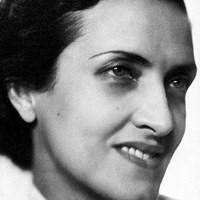Rio de Janeiro (Brasil), 1901 – 1964
By Flávio Aguiar
The verses with neo-symbolist nuances from the early works of the writer from Rio de Janeiro, collected in her debut book Espectros (1919), acquire traits closer to those of the second phase of Modernism, when she approached the avant-gardes. This characteristic was developed throughout the poetic production of the teacher, translator, and columnist. With great skill in balancing the precision of rhymes with the sonority of a metaphorical lexicon, she became one of the most expressive representatives of Brazilian poetry. According to Alfredo Bosi, she was the one who “most happily modulated the short meters.” Her poetry echoes lingering traces of Symbolism, a trait she shares with the poet from Rio Grande do Sul, Mário Quintana.
Her poetic work also turns to children, an audience she dedicated herself to when creating the first children’s library in Rio de Janeiro. Another part of her prose includes essays and lectures on literature, education, and folklore, which she presented during numerous trips abroad. These excursions did not distance her from close relationships with poets such as Manuel Bandeira and the Chilean Gabriela Mistral. Other works: Romanceiro da Inconfidência (1953); Inéditos (1968).



